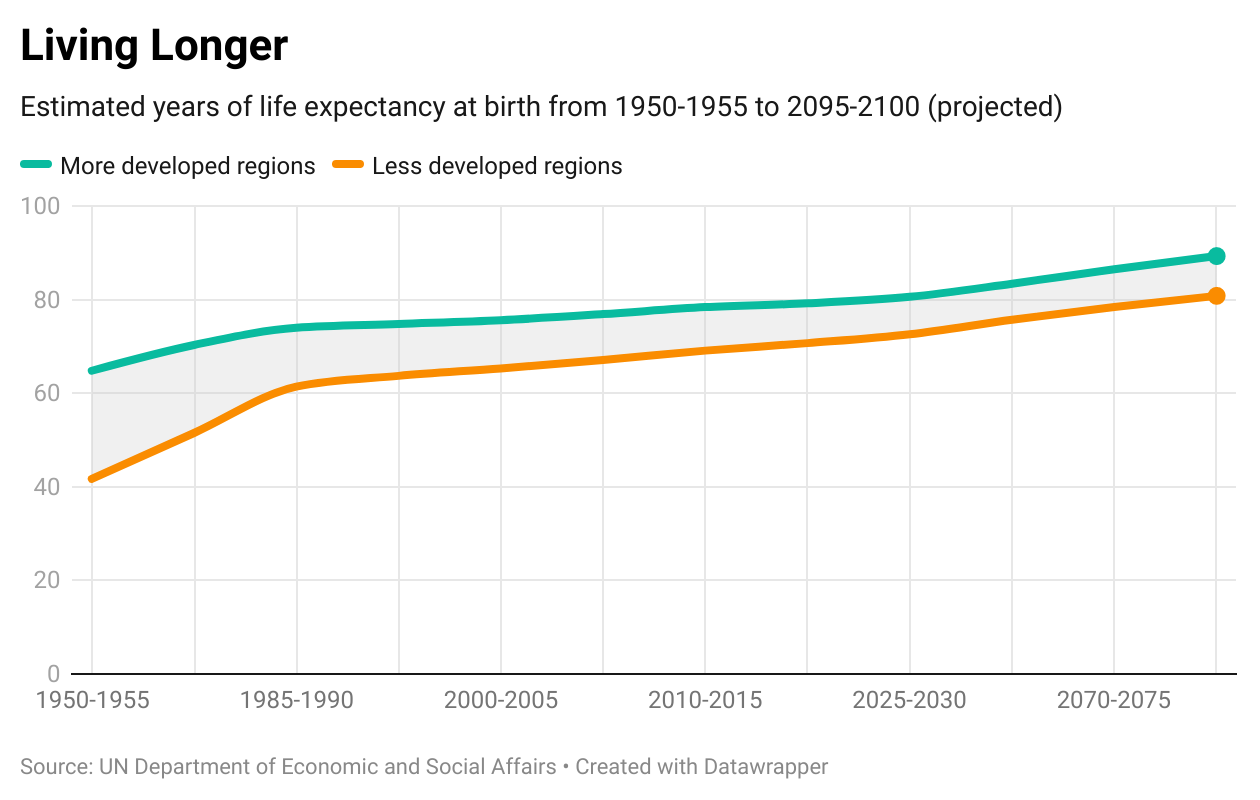Here's how countries compare on healthcare expenditure and life expectancy

Life expectancy for humans has doubled over the last century but there’s still a noticeable gap in average life expectancies between different countries. Image: Unsplash/ Georg Arthur Pflueger

Get involved with our crowdsourced digital platform to deliver impact at scale
Stay up to date:
Health and Healthcare
- Life expectancy for humans has doubled over the last century but there’s still a noticeable gap in average life expectancies between different countries.
- Countries that spent more on healthcare tended to have higher rates of life expectancy, new World Bank data shows.
- Developed countries see higher life expectancies than developing regions but over time the gap is expected to narrow, experts say.
Charted: Healthcare Spending and Life Expectancy, by Country
Over the last century, life expectancy at birth has more than doubled across the globe, largely thanks to innovations and discoveries in various medical fields around sanitation, vaccines, and preventative healthcare.
Yet, while the average life expectancy for humans has increased significantly on a global scale, there’s still a noticeable gap in average life expectancies between different countries.
What’s the explanation for this divide? According to World Bank data compiled by Truman Du, it may be partially related to the amount of money a country spends on its healthcare.
More Spending Generally Means More Years
The latest available data from the World Bank includes both the healthcare spending per capita of 178 different countries and their average life expectancy.
Perhaps unsurprisingly, the analysis found that countries that spent more on healthcare tended to have higher average life expectancies up until reaching the 80-year mark.
However, there were a few slight exceptions. For instance, while the United States has the largest spending of any country included in the dataset, its average life expectancy of 77 years is lower than many other countries that spend far less per capita.
What’s going on in the United States? While there are several intermingling factors at play, some researchers believe a big contributor is the country’s higher infant mortality rate, along with its higher relative rate of violence among young adults.
On the other end of the spectrum, Japan, Singapore, and South Korea have the highest life expectancies on the list despite their relatively low spending per capita.
It’s worth mentioning that this wasn’t always the case—in the 1960s, Japan’s life expectancy was actually the lowest among the G7 countries, and South Korea’s was below 60 years, making it one of the top 30 countries by improved life expectancy:

In fact, the last 60 years have seen many countries substantially increase their average life expectancies from the 30-40 year range to 70+ years. But as the header chart shows, there are still many countries lagging behind in Africa, Asia, and Oceania.
How High Can Average Life Expectancy Go?
Since people are living longer than they’ve ever lived before, how much higher will average life expectancies be in another 100 years?
Recent research published in Nature Communications suggests that, under the right circumstances, human beings have the potential to live up to 150 years.
Projections from the UN predict that growth will be divided, with developed countries seeing higher life expectancies than developing regions.

However, as seen in the above chart from the World Economic Forum and using UN data, it’s likely the gap between developed and developing countries will narrow over time.
How is the World Economic Forum bringing data-driven healthcare to life?
Don't miss any update on this topic
Create a free account and access your personalized content collection with our latest publications and analyses.
License and Republishing
World Economic Forum articles may be republished in accordance with the Creative Commons Attribution-NonCommercial-NoDerivatives 4.0 International Public License, and in accordance with our Terms of Use.
The views expressed in this article are those of the author alone and not the World Economic Forum.
Related topics:
The Agenda Weekly
A weekly update of the most important issues driving the global agenda
You can unsubscribe at any time using the link in our emails. For more details, review our privacy policy.
More on Health and Healthcare SystemsSee all
Kate Whiting
May 3, 2024
Kiran Mazumdar-Shaw
May 2, 2024
Johnny Wood
May 1, 2024
Prakash Tyagi
May 1, 2024








